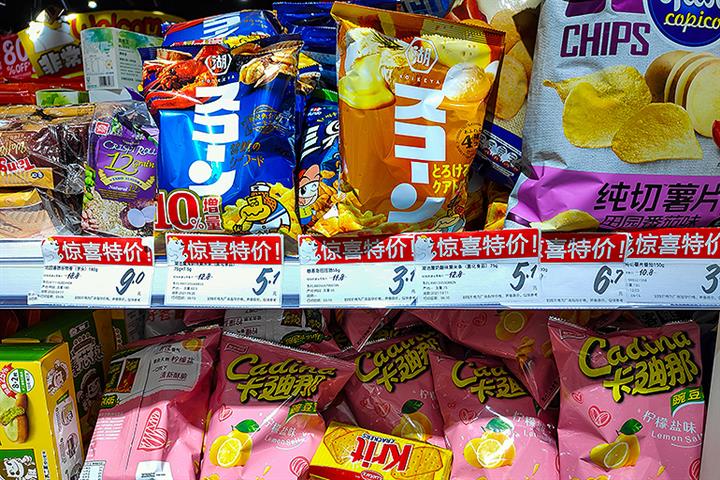 China’s Near-Expired Food Industry Is a Big Draw for Investors
China’s Near-Expired Food Industry Is a Big Draw for Investors(Yicai Global) July 5 -- As cheaper, near-expired foodstuffs gain in popularity among young consumers, the retailing of such products is entering a new phase and startups specializing in the sector are beginning to attract investors.
Expiring foods are those about to reach their shelf life. They are still safe to eat, but vendors often sell them at lower prices to quickly reduce stocks since the items are approaching their expiration date.
An increasing number of sales counters are being set aside for expiring foods in large supermarkets in China, and there are even some specialty stores selling near-expired foods on the streets, Yicai Global has found.
Twenty companies dealing in such foodstuffs were registered in the country in the first half of this year, an 82 percent increase from the same period last year, industrial and commercial data showed.
Franchise retailer HotMaxx has more than 80 outlets in Shanghai, with many adjacent to office buildings and well-known business areas downtown, as evidenced by consumer review platform Dianping.
After signing exclusive inventory distribution contracts with more than 500 famous brands, HotMaxx has become the largest inventory distributor in China. So-called dirt-cheap snacks are available at HotMaxx, where shoppers can pay just 30 percent to 50 percent of the market price to enjoy big-brand foods.
HotMaxx is now able to buy expiring fast-moving consumer goods for 20 percent of the market price from companies such as Procter & Gamble, Unilever, Starbucks, and Nestle, according to the Shanghai-based company’s cooperation deals.
USD1.5 Billion Sales
The privately held company aims to develop into a retailer with annual sales exceeding CNY10 billion (USD1.5 billion) over the next three years, per the deals.
Concern over capital also contributed to the rapid expansion of HotMaxx. The firm has completed four financing rounds since 2019, with two rounds last year, according to public information.
Another startup, Shihuibang, founded in Tianjin, also completed an angel round funding of tens of millions of yuan in March. And Nanjing-based Little Elephant Life, which mainly sells expiring goods, completed a CNY10 million (USD1.5 million) angel round funding in April.
Zhang Yi, chief executive officer and chief analyst of iiMedia Research, believes that the recent boom in expiring food retailing is not only related to a government drive to reduce food waste, but also to an increase in China’s food production capacity and a huge inventory backlog.
Younger Demographic
At the same time, young people who like high-quality consumption but cannot afford it have become the main sales targets for expiring food.
Expiring food has a big market, but it used to be mostly hidden in the corners of large supermarkets, Zhang noted.
Goods got overstocked at producers in the aftermath of the pandemic last year. Many vendors seized the chance to buy them at low cost, ushering in a new development.
There are still no large-scale companies in China’s expiring food sector, and most are new chain stores relying on e-commerce platforms, Zhang said.
Competition is expected to become increasingly fierce after the expansion period. So how to find an effective breakthrough will become the focus of the industry in the future, he added.
Editors: Tang Shihua, Peter Thomas